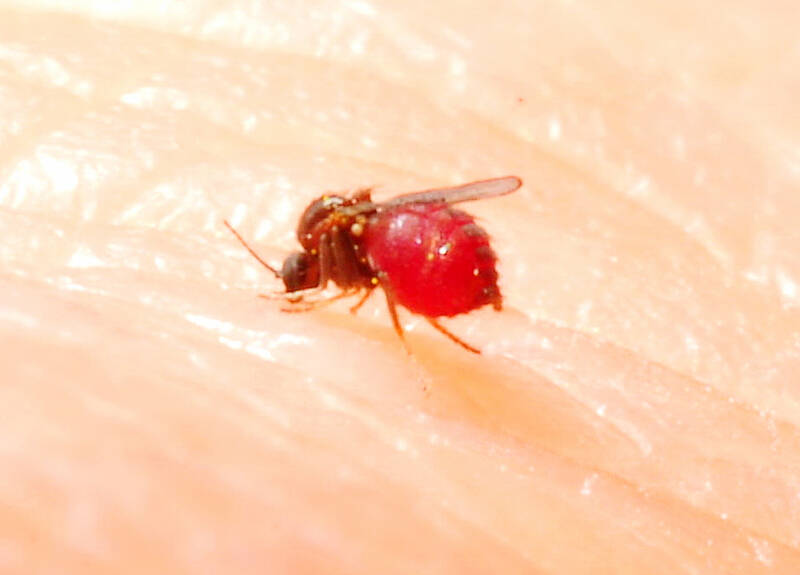Taiwanese scientists have cracked the genetic code of a tiny bloodsucker in an advancement of research on repellant and insecticide development, a study published this month in the journal Insect Biochemistry and Molecular Biology showed.
Forcipomyia taiwana, commonly known in Chinese as the “tiny black mosquito” (小黑蚊), is a species of blood-sucking insect that “wreaks havoc” throughout Taiwan, the Ministry of Health and Welfare said.
Understanding the receptors that enable the sense of smell in female tiny black mosquitoes is a crucial step in creating lures for traps or repellents, said Lin Ming-te (林明德), study coauthor and associate professor at Tzu Chi University’s Department of Molecular Biology and Human Genetics

Photo: Hua Meng-ching, Taipei Times
The team’s analysis of the blood-sucking midges’ genetic materials revealed that they possess 134 of 156 unique olfactory receptors of the Ceratopogonidae family, he told a news conference in Hualien yesterday.
Many of the midges’ olfactory receptors find expression only in females, the sex of the species that bite humans for blood before laying eggs during the spawning season, Lin said.
This means chemicals can be developed to target the receptors, he said.
Extracting enough genetic material to analyze the insect was difficult because they are miniscule, only about one-third the size of common fruit flies, he said, adding that the team scoured the campus for samples.
The significant variation between the genetics of each midge frustrated the genome assembly, Lin said.
The team found that the genetic material could be harvested from a clutch of 20 eggs laid by the same female, eliminating the variation problem, he said.
A complete map of the midge’s genes opens the way for further research into identifying any resistance the insect might have to insecticides, and the history and path of their evolution and spread, Lin said.
The team plans to publish the complete genome of the tiny black mosquito on a open-access Web site to encourage further study of the species, he said.

Chinese Nationalist Party (KMT) Chairman Eric Chu (朱立倫), spokeswoman Yang Chih-yu (楊智伃) and Legislator Hsieh Lung-chieh (謝龍介) would be summoned by police for questioning for leading an illegal assembly on Thursday evening last week, Minister of the Interior Liu Shyh-fang (劉世芳) said today. The three KMT officials led an assembly outside the Taipei City Prosecutors’ Office, a restricted area where public assembly is not allowed, protesting the questioning of several KMT staff and searches of KMT headquarters and offices in a recall petition forgery case. Chu, Yang and Hsieh are all suspected of contravening the Assembly and Parade Act (集會遊行法) by holding

PRAISE: Japanese visitor Takashi Kubota said the Taiwanese temple architecture images showcased in the AI Art Gallery were the most impressive displays he saw Taiwan does not have an official pavilion at the World Expo in Osaka, Japan, because of its diplomatic predicament, but the government-backed Tech World pavilion is drawing interest with its unique recreations of works by Taiwanese artists. The pavilion features an artificial intelligence (AI)-based art gallery showcasing works of famous Taiwanese artists from the Japanese colonial period using innovative technologies. Among its main simulated displays are Eastern gouache paintings by Chen Chin (陳進), Lin Yu-shan (林玉山) and Kuo Hsueh-hu (郭雪湖), who were the three young Taiwanese painters selected for the East Asian Painting exhibition in 1927. Gouache is a water-based

Taiwan would welcome the return of Honduras as a diplomatic ally if its next president decides to make such a move, Minister of Foreign Affairs Lin Chia-lung (林佳龍) said yesterday. “Of course, we would welcome Honduras if they want to restore diplomatic ties with Taiwan after their elections,” Lin said at a meeting of the legislature’s Foreign Affairs and National Defense Committee, when asked to comment on statements made by two of the three Honduran presidential candidates during the presidential campaign in the Central American country. Taiwan is paying close attention to the region as a whole in the wake of a

OFF-TARGET: More than 30,000 participants were expected to take part in the Games next month, but only 6,550 foreign and 19,400 Taiwanese athletes have registered Taipei city councilors yesterday blasted the organizers of next month’s World Masters Games over sudden timetable and venue changes, which they said have caused thousands of participants to back out of the international sporting event, among other organizational issues. They also cited visa delays and political interference by China as reasons many foreign athletes are requesting refunds for the event, to be held from May 17 to 30. Jointly organized by the Taipei and New Taipei City governments, the games have been rocked by numerous controversies since preparations began in 2020. Taipei City Councilor Lin Yen-feng (林延鳳) said yesterday that new measures by